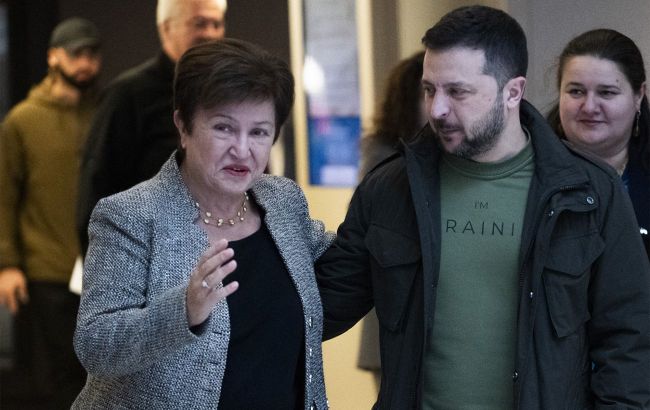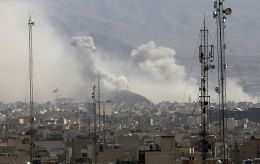Ukraine reaches agreement with IMF on gas procurement, postal bank, customs reform
 Photo: New conditions appeared in IMF-Ukraine memorandum (Getty Images)
Photo: New conditions appeared in IMF-Ukraine memorandum (Getty Images)
The IMF conducted the fourth review of the EFF program, allowing Ukraine to receive the fifth loan tranche. For the first time in the history of cooperation with the fund, the Ukrainian authorities have come this far. RBC-Ukraine investigated the conditions for Ukraine in the new edition of the memorandum of cooperation with the IMF.
Contents
Ukraine successfully passed the fourth review of the EFF loan program, which enabled it to receive the fifth tranche of financial support from the IMF worth $2.2 billion. The funds have already been received by Ukraine and will be directed to finance the state budget.
Since April 2023, when the 4-year EFF program worth $15.6 billion started, Ukraine has received a total of $4.6 billion in three tranches in 2023 and $3.1 billion in two tranches this year. By the end of 2024, two more tranches of $1.1 billion each are expected. They are to be received after program reviews in September and December, provided Ukraine continues to meet all conditions. According to the memorandum, the IMF loan funds were and will be directed to the needs of the state budget.
Two new conditions from the IMF
Ukraine has effectively been demonstrating compliance with all the program conditions for the second year, despite the military situation. The IMF noted that all quantitative performance criteria and structural benchmarks have been met. The Ukrainian economy remains stable, but determining prospects is quite difficult.
Given this uncertainty, the list of conditions for the continuation of the program is formed for a relatively short term. For example, currently, the conditions are defined only until the end of 2024.
Compared to the March edition of the memorandum of cooperation, the list of structural benchmarks has increased by two points. By the end of October, Ukraine will need to adopt changes to the Customs Code, specifically to establish new rules for selecting the head of the State Customs Service and to provide for the re-certification of personnel. Also by the end of October, the so-called "Lozovyi's amendments" (amendments to the Criminal Procedure Code of Ukraine regarding the terms for pre-trial investigation - Ed.) that allow closing criminal cases for corruption offenses after the expiration of the pre-trial investigation period must be repealed.
Overall, by the end of the year, for scheduled financing, Ukraine needs to fulfill 14 conditions, including analyzing the financial condition of centralized heating supply companies, adopting amendments to the Customs Code to adapt it to EU conditions, developing a methodology for assessing the effectiveness of tax benefits, among others.
Not just benchmarks: What's new in the memorandum
In the new edition of the memorandum, it is effectively confirmed that the situation with energy supply in winter may be difficult. It will take 12-15 months to establish additional generation through gas turbines, and this is considered a medium-term solution to the problem. An increase in generation through biofuel, solar, or wind energy is also planned in the medium term.
At the same time, it is emphasized that gas storage facilities remain secure, although above-ground facilities may be attacked. However, if Naftogaz of Ukraine (national oil and gas company - Ed.) has to import gas, this can be done through an EBRD loan of $200 million. If these funds are insufficient, the company will have to be allocated budget funds for gas procurement.
"If Naftogaz faces a liquidity shortfall, we will assess the amount of PSO compensation in 2024 based on actual documentary proven expenditures," the memorandum says.
The memorandum also eases the conditions for providing banking services to the population. While the March edition of the memorandum effectively prohibited the creation of a new bank for Ukrposhta (national postal operator - Ed.), it is now agreed to approach solving the problems of vulnerable categories of financial services consumers inclusively.
"The authorities have committed to encouraging financial institutions to do more to meet the needs of vulnerable clients and to reintegrate de-occupied territories, and preparing by end-July 2024 a legislative draft proposal for a new specialized and restricted banking license which aims to quickly tackle growing financial inclusion challenges by leveraging on existing infrastructure such as the postal network," the memorandum states.
Several sources in the banking sector confirmed that it is about Ukrposhta, which will be granted a limited banking license. "It is expected that Ukrposhta will be able to provide a certain list of banking services," one of the RBC-Ukraine's sources said.
It is not yet known what services and territories this license will cover. The head of Ukrposhta, Ihor Smilianskyi, and the National Bank (NBU) have so far refrained from comments. According to the memorandum, the new special bank will participate in the deposit insurance system but will be limited in credit and financing operations.
The memorandum also names the state banks that are planned to be privatized. "We are also preparing two systemic state-owned banks for sale, Sense Bank and Ukrgasbank. We are planning to appoint an internationally recognized financial advisor by end-September 2024 using a transparent procedure and in consultation with IFIs," the document says.
The Government of Ukraine promises the IMF that the issue of restructuring external commercial debt of almost $20 billion will be resolved in the coming months. "Our goal remains to reach agreement on a debt restructuring with our international bondholders and other participating commercial creditors by the time the current standstill ends in August 2024," the memorandum states. According to Ukraine's Finance Minister Serhii Marchenko, the agreement is planned to be reached by August 1.
Negative scenario
The risks of negative developments in Ukraine remain high, according to the IMF. They are associated with the intensity and duration of military actions. "Security risks could persist for longer than expected, putting pressures on our fiscal position, and leading to the emergence of additional budget needs," the document notes.
A prolonged and intense war will negatively impact business and household sentiments, as well as exchange and inflation expectations, slow down migrant return rates, and exacerbate labor market disparities.
"Export transit routes could be significantly interrupted, there could be further damage to energy infrastructure, or past supply chain disruptions (imports and transit cargo blockages - Ed.) could resurface, weighing on production costs and firm profitability," the document states.
If these risks materialize, delays in external financing from the US and EU may reoccur. As a result, allocated funds may simply not be sufficient. "Moreover, in the event of such risks materializing, the needed higher domestic financing may become difficult to mobilize," the memorandum emphasizes.
A negative scenario could lead to a GDP decline of up to 4% this year, compared to expected growth of 3-4% in the basic scenario. The country's financial needs could increase by $19 billion. It may be necessary to return to a fixed exchange rate and increase revenues from personal income tax, as well as luxury goods or excise taxes.
However, for now, according to Oleksandr Paraschii, head of research at IC Concorde Capital, it is advisable to focus on the basic scenario. Moreover, some indicators suggest reality looks even better than forecasted. For instance, while the IMF has slightly worsened its economic growth expectations - from 3.2% in March to 2.5% now - Ukraine's GDP grew by 6.5% in the first quarter, whereas the IMF had forecasted 3.8%.
"I think the deterioration of the Ukrainian economic growth forecast is largely due to the IMF's desire to facilitate the completion of negotiations with creditors on the Ministry of Finance's terms regarding the restructuring of external commercial debt," Paraschii commented.
If the situation develops according to the basic scenario, there should be no particular concerns about budget financing shortages. The IMF's conditions by the end of the year appear quite achievable. This essentially guarantees the inflow of funds from the fund.
Additionally, the successful implementation of the IMF program reduces concerns among other donors, including the US, EU, and countries from other regions that provide financial support to Ukraine on a bilateral basis.

